Revolution From Within: Experts, Managers and Technocrats in the Long Transformation of 1989
Posted on 5 June, 2018 in1989 1989 after 1989 Conference Eastern Europe Europe Human Rights Post Socialism Socialism

The programme for our collaborative conference with Imre Kertész Kolleg Jena is now available.
The conference will form Imre Kertész Kolleg Jena’s annual conference and will take place on the 14-15 June 2018 at Friedrich-Sschiller-Universitat Jena. A number of papers will be given by members of 1989 after 1989 and the University of Exeter, including Tobias Rupprecht on Pinochet in Prague: Latin American Neoliberalism and (Post-) Socialist Eastern Europe; James Mark on Europe and its Others:
Re-imagining a Continental Space in Late Socialism; and Ned Richardson-Little on Lawyers, Human Rights and Democratization in Eastern Europe.
The conference will combine perspectives of intellectual and conceptual history, social history of expert cultures, new institutionalist studies, cultural anthropology, history of sciences etc., the focus of the conference is on the creation of expert knowledge, its political implications as well as direct influences during late State Socialism and the liberal democratic regimes after 1989. It will also concentrates on concepts of social management and social control formulated by scientists and experts, political applications of expert knowledge, and interactions between the technocratic, managerial and expert elites, both at home and internationally, as well as the entanglements of political rule and scientific knowledge and expert skills in dynamically changing social contexts.
More information on the conference can be found on the Revolution From Within conference page
Would you like to work on 1989 after 1989 and Socialism Goes Global? Vacancies for Postdoctoral Research Associates available – apply now!
Posted on 21 December, 2017 in1989 after 1989 Job opportunities Post Socialism Rethinking 1989 Socialism

Supporting the work of Professor James Mark, 1989 after 1989 and the AHRC Socialism Goes Global, we have 3 vacancies for Postdoctoral Research Associates with immediate start.
The 12 month fixed term post with 1989 after 1989 and based in Exeter, UK will focus on the fall of state socialism in Eastern Europe in global perspective, focusing on political, economic and cultural themes.
Socialism Goes Global, supported by the Arts and Humanities Research Council, have two Postdoctoral Research Associate vacancies (fixed term for 9 months, based in Exeter), the first addressing themes of gender and labour and the second focusing on the themes of war, peace and authoritarianism.
Deadline for applications is 17 January 2018
Interviews anticipated late January 2018
About Exeter University
We are a Russell Group university boasting a vibrant academic community with over 21,000 students. Ranked in the top 1% of universities in the world, 98% of our research is rated as being of international quality and focuses on some of the most fundamental issues facing the world today. We encourage proactive engagement with industry, business and community partners to enhance the impact of research and education and improve the employability of our students.
The Posts
The College of Humanities wishes to recruit for three posts
- Postdoctoral Research Associate to support the work of the project 1989 after 1989: Rethinking the Fall of State Socialism in Global Perspective
http://1989after1989.exeter.ac.uk/This full-time Leverhulme Trust-funded post is available immediately on a fixed term basis for 12 months. The research will address the fall of state socialism in Eastern Europe in global perspective, focussing on political, economic and cultural themes. - Postdoctoral Research Associate to support the work of the Arts and Humanities Research Council (UK)-funded project Socialism Goes Global. Cold War Connections Between the ‘Second’ and ‘Third Worlds’
http://socialismgoesglobal.exeter.ac.uk/This full-time post is available immediately on a fixed term basis for 9 months, research will focus on the themes of gender and labour. - Postdoctoral Research Associate to support the work of the Arts and Humanities Research Council (UK)-funded project Socialism Goes Global. Cold War Connections Between the ‘Second’ and ‘Third Worlds’ http://socialismgoesglobal.exeter.ac.uk/This full-time post is available immediately on a fixed term basis for 9 months, research will focus on the themes of war, peace and authoritarianism.
Please indicate in your application which post(s) you are applying for (candidates are welcome to apply for all three).
About You
The successful applicants will have the skills to carry out research at historical archives; be able to carry out historical analysis on archival material (with guidance); possess a reading capacity in one or more languages of the region, to a high academic standard; be able to report effectively on research progress and outcomes; be able to write academic texts; and to communicate complex information, orally, in writing and electronically in academic English.
Applicants will possess a relevant PhD (or be nearing completion) or possess an equivalent qualification/experience in a related field of study. They will be able to demonstrate sufficient knowledge of research methods and techniques needed to work within these research projects. Experience of work in related research fields would be beneficial.
Interviews are expected to take place in late January 2018.
What We Can Offer You
Salary will be from £28,936 per annum pro rata within the Grade E band (£26,495 – £33,518) depending on qualifications and experience.
- Freedom (and the support) to pursue your intellectual interests and to work creatively across disciplines to produce internationally exciting research;
- Support teams that understand the University wide research and teaching goals and partner with our academics accordingly
- An Innovation, Impact and Business directorate that works closely with our academics providing specialist support for external engagement and development
- Our Exeter Academic initiative supporting high performing academics to achieve their potential and develop their career
- A beautiful campus set in the heart of stunning Devon
Please ensure you read our Job Description and Person Specification for full details of this role.
To view the Job Description and Person Specification document please click here.
To apply and view the full job advert, please follow the link to the Exeter University Vacancies Board and Application Portal.
For further information please contact:
Professor James Mark, Principal Investigator 1989 after 1989 and Socialism Goes Global – J.A.Mark@exeter.ac.uk
Natalie Taylor, Leverhulme Trust 1989 after 1989 Project Co-ordinator (works Monday-Wednesday) N.H.Taylor@exeter.ac.uk
Catherine Devenish, AHRC Socialism Goes Global Project Co-ordinator (works Thursday and Friday) C.Devenish@exeter.ac.uk
[Top]CFP: Socialist Heritage Around the World: A Heritage Without Borders?
Posted on 27 November, 2017 inCall for Papers Heritage Post Socialism Socialism
4th Biennial Conference”Heritage Across Borders”
Association of Critical Heritage Studies
1-6th September, 2018
Zhejiang University, Hangzhou, China
Call for Papers: Socialist Heritage Around the World: A Heritage Without Borders?
Abstract:
This session intends to shed light on the heritage of Socialist pasts around the world. We particularly would like to explore and compare cases of former Soviet States and Republics, but also those of Asia, Latin America and Africa. Indeed, Socialist world seemed to have been, if not excluded, not enough analyzed in heritage history. Therefore, we propose, not to project ‘Western’ categories onto Socialist countries, but rather to analyze specificity of Socialist conceptions and uses of heritage (Smith 2006) – taking thus on board the new guidelines of the growing scientific fields that are critical heritage studies.
Indeed, in these regimes base(d) on Marxism-Leninism, the edification of Socialism – in the literal and figurative sense – determined artistic, cultural and heritage policies. Ideology undeniably influenced the way of theorizing and ‘making’ heritage (Heinich 2006): it indeed oriented the choice of preserving the monuments of the past, as well as the type of artistic and cultural productions in the present, as also their way to be preserved for the future. Socialist regimes thus left material remains, especially monuments and architectures, that are still omnipresent all around the world. But is Socialist heritage a heritage without borders?
We invite cross-disciplinary papers to explore two main (but not limited) directions:
* First, the session aims to put into perspective ways of thinking and using heritage in Socialist countries. How did the Marxist-Leninist conception of Space and Time directly influenced heritage? What were profound reasons of heritagization in Socialist countries? Is there a “Socialist” interpretation of heritage? How did the Soviet conception of heritage influenced other countries? What are the differences between Socialist conceptions of heritage and those found in the capitalist world?
* Second, the session intends to better grasp the complexity of these “ideological heritages” in the era of post-Socialist transitions and social rupture. Policies toward material remains of Socialist pasts diverge indeed greatly and are often paradoxical, ranging from abandonment to “museumfication” depending on national contexts. We invite paper to precisely analyse the link between history writing, memory, identity (re)constructing and Socialist heritage in post-Socialist countries.
Deadline : 30th of November 2017
Guidelines to submit your proposal:
http://2018achs.com/#/session/paperDraft
If you need any information, please contact Jule Deschepper: julie.deschepper@inalco.fr
[Top]Programme now available for our conference on State Socialism, Heritage Experts and Internationalism
Posted on 20 October, 2017 inArea Studies Communism East Asia Eastern Europe End of Yugoslavia Globalisation Heritage Heritage Experts Latin America Memory Nation Building Post Socialism Post-Soviet Cities South Africa

State Socialism, Heritage Experts and Internationalism in Heritage Protection after 1945
21-22 November 2017
Location: Reed Hall, University of Exeter, UK
Join us for our conference exploring the rising contributions of socialist and non-aligned actors to the development of heritage at both domestic and international levels.
CONFERENCE SYNOPSIS
Histories of heritage usually perceive their object of study as a product of western modernity, and exclude the socialist world. Yet, understood as a cultural practice and an instrument of cultural power, and as a “right and a resource”, heritage has played important roles in managing the past and present in many societies and systems. In the postwar period, preservation became a key element of culture in socialist and non-aligned states from China, the Soviet Union, and the Eastern Bloc to Asia, Latin America and Africa. Attention paid to the peoples’ traditions and heritage became a way to manifest the superiority and historical necessity of socialist development. However, the contribution of socialist states and experts to the development of the idea of heritage is still to be fully excavated.
The conference aims to understand the rising contributions of socialist and non-aligned actors to the development of heritage at both domestic and international levels. This phenomenon was in part the result of country-specific factors – such as a reaction to rapid industrial development; the destruction of both the Second World War or wars of national liberation; and the necessity to (re)-invent national traditions on socialist terms. But it was also due the growth of a broader international consensus on international heritage protection policies – in which socialist and non-aligned states and their experts played an important role. To this end, the conference will also address the relationship between socialist conceptions of heritage and those found in the capitalist world: to what extent can we discern the convergence of Eastern and Western dynamics of heritage discourses and practices over the second half of the twentieth century? To what degree did heritage professionals from socialist states play a role in the formation of the transnational and transcultural heritage expertise? To what extent did heritage still play a role in Cold War competition? Socialist states claimed that their respect for progressive traditions and material culture distinguished their superior methods of development from that of the capitalist world. Non-Aligned countries often attempted to blend aspects of socialist and capitalist logics of cultural heritage politics.
CONFERENCE PROGRAMME
Day 1 – 21 November
08.45-09.15 Registration
09.15-09.30 Introduction
09.30-10.30 Panel 1: Transnational Circulations of Heritage Concepts and Ideas (Part 1)
Chair James Mark
Discussant Michael Falser
Nikolai Vukov (Bulgarian Academy of Sciences) Ethnographising the Past, Ideologising the Present: Traditional Heritage as an Ideological Resource and International Asset in Eastern Europe after 1945
Yao Yuan (Nanjing University) International Factors in Shaping Chinese Heritage Conservation Policy
10.30-10.45 Refreshment Break
10.45-12.00 Panel 1: Transnational Circulations of Heritage Concepts and Ideas (Part 2)
Chair Corinne Geering
Discussant Nelly Bekus
Marko Spikic (University of Zagreb) Between Exceptionalism and Internationalism: Ethics and Politics of the Conservation System in People’s Republic of Croatia of the 1950s
Pablo Gonzalez (University of Lisbon) A Rebel Heritage for the Cuban Revolution: Socialist Internationalism, Art and Soviet Influence
12.00-13.00 Keynote Lecture: Stephen Smith (University of Oxford) Heritage in Contention: the Soviet Union and China after 1945
13.00-14.30 Lunch
14.30-16.00 Panel 2: International Organisations and Socialist Heritage
Chair Kate Cowcher
Discussant Nikolai Vukov
Nelly Bekus (University of Exeter) Tracing Multiple Logics in Soviet Heritage-Making: Pan-Soviet, National and International Agencies of Cultural Power
Corinne Geering (Justus-Liebig-University Giessen) World Heritage beyond UNESCO: Soviet Approaches to World Heritage before 1988
Emanuela Grama (Carnegie Mellon University) International mediations: UNESCO visits to Romania at the end of the Cold War or heritage as a right to place
16.00-16.15 Refreshment Break
16.15-17.15 Panel 3: South East Asia and Socialist Heritage
Chair Natalia Telepneva
Discussant James Mark
Michael Falser (Heidelberg University – Université Bordeaux-Montaigne) Cold War and non-aligned heritage politics in South and South-East Asia
Alicja Gzowska (University of Warsaw) One man’s dream? Polish conservation experts in Vietnam
19.00 Drinks Reception – Devon and Exeter Institution
20.00 Conference Dinner – Rendezvous
Day 2 – 22 November
09.00 – 10.30 Panel 4: The Development of Socialist Ideas of Heritage in Africa (Part 1)
Chair Nelly Bekus
Discussant Paul Betts
Kate Cowcher (University of Maryland) Origin Myths and Incarcerations: Ethiopia’s National Museum amidst socialist revolution
Piotr Marciniak (Poznan University of Technology) From Warsaw to Faras. The Polish School of Reconstruction and Conservation of Monuments and Sites: People, Doctrine and History
Natalia Telepneva (University of Warwick) The Soviet-Somali Archaeological Expedition and the Global Struggle for the Horn of Africa
10.30-10.45 Refreshment break
10.45-11.45 Panel 4: The Development of Socialist Ideas of Heritage in Africa (Part 2)
Chair Michael Falser
Discussant Marko Spikic
Nadine Siegert (University of Bayreuth) (Re)activated heritage. State-sponsored socialist propaganda and architecture in the Luanda cityscape
Nina Díaz Fernández (University of Ljubljana) Yugoslav Experts and the Protection of Monuments in the Third world
11.45-13.00 Round Table
Paul Betts (University of Oxford)
Michael Falser (Heidelberg University – Université Bordeaux-Montaigne)
James Mark (University of Exeter)
13.00 Farewell Lunch
Conference Convenors:
 Professor James Mark and Dr. Nelly Bekus, University of Exeter and 1989 after 1989
Professor James Mark and Dr. Nelly Bekus, University of Exeter and 1989 after 1989
Dr. Michael Falser, Cluster of Excellence Asia and Europe in a Global Context, Heidelberg University
Dr Ezster Gantner, Herder Institute
[Top]Secret Agents and the Memory of Everyday Collaboration in Communist Eastern Europe
Posted on 17 October, 2017 in1989 Area Studies Communism Eastern Europe End of Yugoslavia GDR Hungary Memory Post Socialism Rethinking 1989 Romania

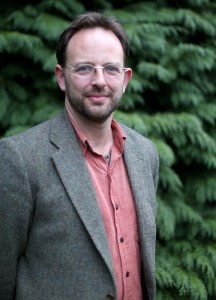 Professor James Mark’s co-edited volume Secret Agents and the Memory of Everyday Collaboration in Communist Eastern Europe is now available through Anthem Press.
Professor James Mark’s co-edited volume Secret Agents and the Memory of Everyday Collaboration in Communist Eastern Europe is now available through Anthem Press.
This collection of essays addresses institutions that develop the concept of collaboration, and examines the function, social representation and history of secret police archives and institutes of national memory that create these histories of collaboration. The essays provide a comparative account of collaboration/participation across differing categories of collaborators and different social milieux throughout East-Central Europe. They also demonstrate how secret police files can be used to produce more subtle social and cultural histories of the socialist dictatorships. By interrogating the ways in which post-socialist cultures produce the idea of, and knowledge about, “collaborators,” the contributing authors provide a nuanced historical conception of “collaboration,” expanding the concept toward broader frameworks of cooperation and political participation to facilitate a better understanding of Eastern European communist regimes.
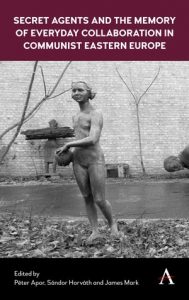 Edited by Péter Apor, Sándor Horváth and James Mark, the essays are framed into three parts – Institutes, Secret Lives and Collaborating Communities and include topics such as the Stasi Records of the former GDR; memory in Latvia, Slovak and the Czech Republics; Tito and intellectuals 1945-80; entangled stories with the Former Securitate; Regional-level Party Activists in Slovakia and priest collaboration in Slovak Catholic memory after 1989.
Edited by Péter Apor, Sándor Horváth and James Mark, the essays are framed into three parts – Institutes, Secret Lives and Collaborating Communities and include topics such as the Stasi Records of the former GDR; memory in Latvia, Slovak and the Czech Republics; Tito and intellectuals 1945-80; entangled stories with the Former Securitate; Regional-level Party Activists in Slovakia and priest collaboration in Slovak Catholic memory after 1989.
“This excellent volume marks a genuine breakthrough in our knowledge about the everyday lives of the people who made up the secret police, of their motivations and their experiences. It challenges binary visions of the past and powerfully highlights the complexity of the term ‘collaboration.’ Ultimately, it makes a case for the human factor in the history of the repressive state.”
Ulf Brunnbauer, Director, Leibniz Institute for East and Southeast European Studies, Regensburg, Germany
Table of Contents
Frameworks: Collaboration, Cooperation, Political Participation in the Communist Regimes
(The Editors)
Part 1: Institutes
Chapter 1: A Dissident Legacy, The ‘Federal Commissioner for the Stasi Records of the Former GDR’ (BStU) in United Germany
(Bernd Schaefer)
Chapter 2: In Black and White? The Discourse on Polish Post-War Society by the Institute of Polish Remembrance
(Barbara Klich-Kluczewska)
Chapter 3: The Exempt Nation: Memory of Collaborationism in Contemporary Latvia
(Leva Zake)
Chapter 4: Institutes of Memory in the Slovak and Czech Republics – What Kind of Memory?
(Martin Kovanič)
Chapter 5: Closing the Past – Opening the Future. Hungarian Victims and Perpetrators of the Communist Regime
(Péter Apor and Sándor Horváth)
Chapter 6: To Collaborate and to Punish. Democracy and Transitional Justice in Romania
(Florin Abraham)
Part 2: Secret Lives
Chapter 7: ‘Resistance through Culture’ or ‘Connivance through Culture.’ Difficulties of Interpretation; Nuances, Errors, and Manipulations
(Gabriel Andreescu)
Chapter 8: Intellectuals between Collaboration and Independence. Politics and Everyday Life in the Prague Faculty of Arts in Late Socialism
(Matěj Spurný)
Chapter 9: Tito and Intellectuals – Collaboration and Support, 1945–1980
(Josip Mihaljević)
Chapter 10: Spy in the Underground. Polish Samizdat Stories
(Paweł Sowiński)
Chapter 11: Entangled Stories. On the Meaning of Collaboration with the Former Securitate
(Cristina Petrescu)
Part 3: Collaborating Communities
Chapter 12: Finding the Ways (around). Regional-level Party Activists in Slovakia
(Marína Zavacká)
Chapter 13: ‘But Who is the Party?’ History and Historiography in the Hungarian Communist Party
(Tamás Kende)
Chapter 14: Forgetting ‘Judas’. Priest Collaboration in Slovak Catholic Memory after 1989
(Agáta Drelová)
Chapter 15: Informing as Life-Style. Unofficial Collaborators of the Hungarian and the East-German State Security (Stasi) Working in the Tourism Sector
(Krisztina Slachta)
→ Order your copy through the Anthem Press website: Secret Agents and the Memory of Everyday Collaboration in Communist Eastern Europe
[Top]Ideological Recycling of the Socialist Legacy. Reading Townscapes of Minsk and Astana
Posted on 8 September, 2017 inArea Studies Nation Building Post Socialism Post-Soviet Cities Socialism
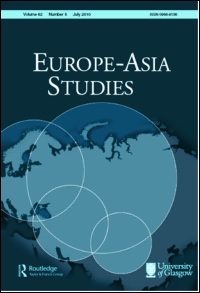 Nelly Bekus’ article Ideological Recycling of the Socialist Legacy. Reading Townscapes of Minsk and Astana has recently been published in the Journal for Europe-Asia Studies, Volume 69, Issue 5, July 2017.
Nelly Bekus’ article Ideological Recycling of the Socialist Legacy. Reading Townscapes of Minsk and Astana has recently been published in the Journal for Europe-Asia Studies, Volume 69, Issue 5, July 2017.
Her article addresses the ways in which the systemic transformation of the former Soviet republics has been reflected in urban development in two capital cities, Minsk (Belarus) and Astana (Kazakhstan). Changes taking place in these capitals have been analysed through the prism of an ideological recycling of the socialist legacy, a concept that permits exploration of which aspects of the socialist legacy have been jettisoned and which retained, in the process of formation of a capital. The article explores the nationalising strategies adopted by Belarus and Kazakhstan and reified by various practices, including those involving the recasting of cities. These strategies, however, are analysed not as inventions of post-Soviet regimes, but as forms of structural continuity.
→ Ideological Recycling of the Socialist Legacy. Reading Townscapes of Minsk and Astana
[Top]The “Children of Crisis”: Making Sense of (Post)socialism and the End of Yugoslavia
Posted on 24 July, 2017 in1989 1989 after 1989 End of Yugoslavia Generation Memory Post Socialism Socialism
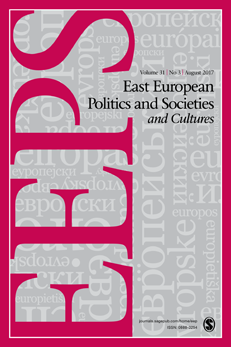 Ljubica Spaskovska’s article The “Children of Crisis”: Making Sense of (Post)socialism and the End of Yugoslavia has just been published in the Journal of East European Politics and Societies, Volume 31, Issue 3, August 2017. It forms part of a special section on the Genealogies of Memory, guest edited by Ferenc Laczó and Joanna Wawrzyniak.
Ljubica Spaskovska’s article The “Children of Crisis”: Making Sense of (Post)socialism and the End of Yugoslavia has just been published in the Journal of East European Politics and Societies, Volume 31, Issue 3, August 2017. It forms part of a special section on the Genealogies of Memory, guest edited by Ferenc Laczó and Joanna Wawrzyniak.
Ljubica’s article traces certain mnemonic patterns in the ways individuals who belonged to the late-socialist Yugoslav youth elite articulated their values in the wake of Yugoslavia’s demise and the ways they make sense of the Yugoslav socialist past and their generational role a quarter of a century later. It detects narratives of loss, betrayed hopes, and a general disillusionment with politics and the state of post-socialist democracy that appear to be particularly frequent in the testimonies of the media and cultural elites. They convey a sense of discontent with the state of post-Yugoslav democracy and with the politicians—some belonging to the same generation—who embraced conservative values and a semi-authoritarian political culture. The article argues that an emerging new authoritarianism and the very process of progressive disillusionment with post-socialist politics allowed for the emergence and articulation of such alternative, noninstitutionalized individual memories that, whilst not uncritical of the Yugoslav past, tend to highlight its positive aspects.
→ East European Politics and Socieities, Volume 31, Issue 3, August 2017
[Top]The Other Globalisers conference programme now available
Posted on 22 June, 2017 in1989 after 1989 Area Studies Cold War Globalisation Neoliberalism Post Socialism Rethinking 1989 Socialism

Join the 1989 after 1989 research team for our conference on the “Other Globalisers” – how the socialist and the non-aligned world shaped the rise of post-war economic globalisation. Based at Exeter, this conference is the second in a series of events exploring how processes and practices that emerged from the socialist world shaped the re-globalised world of our times.
The globalisation of the world economy has most often been portrayed as the final triumph of a neoliberal international order led by the West. By focusing on the socialist and the non-aligned world, this conference, by contrast, aims to rethink the histories of postwar globalisation by addressing forces and models of global economic interdependence other than those of Western capitalism. Acknowledging that actors from these worlds could be contributors to the emerging neoliberal consensus, as well as to other forms of regional economic integration and global trade that survive to this day, we hope to encourage an interdisciplinary dialogue between scholars using different approaches to global interconnectedness, and/or working on a variety of regions.
CONFERENCE PROGRAMME
Day 1 – July 6
The Upper Lounge, Reed Hall, University of Exeter
8.45-9.15 Welcome Drinks
9.15-9.30 Introduction by the Organisers
9.30-11.30 Panel 1: Chronologies of Socialist Globalisations
Discussant: Wolfgang Knöbl (Hamburger Institut für Sozialforschung)
Marc-William Palen (University of Exeter) – Marx and Manchester: The Socialist Foundations of Post-1945 Globalisation
James Mark (University of Exeter) – Alternative? Socialist? Writing Eastern Europe and the Soviet Union into Postwar Globalisation
Christina Schwenkel (University of California – Riverside) – The Afterlife of Global Socialism: Technology and Mobility in the Postcolony
11.30-11.45 Refreshment Break
11.45-13.00 Panel 2: Global Integration
Discussant: Federico Romero (European University Institute)
Angela Romano (University of Glasgow) – Competing Plans of Pan-European Cooperation: European Community’s Policy and Soviet Proposals During the 1970s Globalization
Besnik Pula (Virginia Tech) – From Reform Socialism to Transnational Capitalism: The Political Economy of Foreign Direct Investment in Central and Eastern Europe
13.00-14.30 Lunch Break
14.30-16.30 Panel 3: Global Institutions Without Imperialism
Discussant: Richard Toye (University of Exeter)
Johanna Bockman (George Mason University) – Financial Globalisation Through Socialist and Non-Aligned Banks
Max Trecker (Institute for Contemporary History, Berlin) – Globalisation by Import Substitution? The Council for Mutual Economic Assistance (CMEA) and the Global South
Vlad Pașca (New Europe College) – Global Advocacy or Self-Interested Relativism? Socialist Romania, International Organizations, and the Quest for Economic Development (1960s-1980s)
Ljubica Spaskovska (University of Exeter) – The Non-Aligned, the UN and the Defeat of the ‘New International Economic Order’
16.30-16.45 Coffee Break
16.45-17.45 Round Table Discussion
Johanna Bockman (George Mason University)
Wolfgang Knöbl (Hamburger Institut für Sozialforschung)
Federico Romero (European University Institute)
19.00 Drinks Reception
20.30 Conference Dinner
Day 2 – July 7
Innovation Centre, University of Exeter
8.45-9.30 Welcome Drinks
9.30-10.45 Panel 4: Neoliberalism and the Socialist and Nonaligned Worlds
Discussant: James Mark (Exeter)
Patrick Neveling (School of Oriental and African Studies) – The New International Division of Labour before the New International Economic Order: Special Economic Zones and Neoliberal Globalisation since 1947
Tobias Rupprecht (University of Exeter) – “Neoliberal” Ideas in the Communist Periphery
10.45-11.00 Refreshment Break
11.00-13.00 Panel 5: Africa and Alternative Globalisations
Discussant: Patrick Neveling (School of Oriental and African Studies)
Alanna O’Malley (Leiden University) – The Road to UNCTAD: The Exploration of Economic Sovereignty by African Countries at the United Nations, 1958-1962
Darius A’Zami (Renmin University of China) – Extra-Liberal Interdependence: The Land Commission, Heterodox Globalisation and its Roots in Sino-Tanzanian Relations in the Cold War
Theodora Dragostinova (The Ohio State University) – The Second World in the Third: Bulgarian Notions of Economic and Cultural Development in Nigeria, 1976-1982
Pavel Szobi (European University Institute) – Was Angola the “Czechoslovak Africa?” The Obstacles of the ČSSR Support for the MPLA Government Between 1975 and 1992
13.00-14.00 Lunch Break
14.00-16.00 Panel 6: Resources and Experts
Discussant: Piers Ludlow (LSE)
Ned Richardson-Little (University of Exeter) – East Germany and the Failed Dream of Global Socialist Oil Solidarity
Jan Zofka (University of Leipzig) – Coal as the Other Oil: East German Technical Experts and Industrial Expansion in the Socialist World of the 1950s
Shuxi Yin (Hefei University of Technology) – Sino-Soviet Rubber Cooperation, 1950-1953
Andrew Kloiber (McMaster University) – Brewing Global Socialism: Coffee, East Germans and the World, 1949-1989
16.15-17.00 Concluding Discussion
If you would like to attend the Other Globaliser’s conference on the 6-7 July, please contact the Project Co-ordinator, Natalie Taylor – N.H.Taylor@exeter.ac.uk
[Top]
Ljubica Spaskovska’s Monograph Now Available: The Last Yugoslav Generation
Posted on 24 May, 2017 in1989 after 1989 End of Yugoslavia Post Socialism Socialism Uncategorized

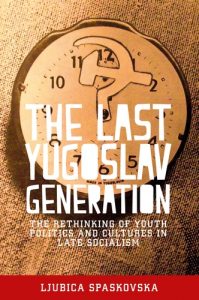 Manchester University Press have now published Dr Ljubica Spaskovska‘s new book – The Last Yugoslav Generation: The Rethinking of Youth Politics and Cultures in Late Socialism.
Manchester University Press have now published Dr Ljubica Spaskovska‘s new book – The Last Yugoslav Generation: The Rethinking of Youth Politics and Cultures in Late Socialism.
Her monograph examines the development of youth culture and politics in socialist Yugoslavia, focusing specifically on the 1980s. Rather than examining the 1980s as a mere prelude to the violent collapse of the country in the 1990s, the book recovers the multiplicity of political visions and cultural developments that evolved at the time and that have been largely forgotten in subsequent discussion. She argues that the youth of this generation sought to rearticulate the Yugoslav socialist framework in order to reinvigorate it and ‘democratise’ it, rather than destroy it altogether.
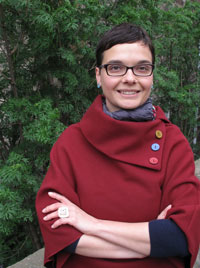 Ljubica Spaskovska is an Associate Research Fellow working on our research project 1989 after 1989 at the University of Exeter. Her research maps the history of the end of Yugoslavia’s global engagements not only as a subject/phenomenon associated with political/diplomatic history, but also as a broader societal project.
Ljubica Spaskovska is an Associate Research Fellow working on our research project 1989 after 1989 at the University of Exeter. Her research maps the history of the end of Yugoslavia’s global engagements not only as a subject/phenomenon associated with political/diplomatic history, but also as a broader societal project.
→ Purchase The Last Yugoslav Generation
[Top]
Join us for our next conference on State Socialism, Heritage Experts and Internationalism in Heritage Protection after 1945
Posted on 26 April, 2017 in1989 after 1989 Area Studies Cold War Communism Heritage Heritage Experts Internationalism Post Socialism Post-Soviet Cities Post-Soviet Countries Socialism

Join us in Exeter for our conference exploring the rising contributions of socialist and non-aligned actors to the development of heritage at both domestic and international levels.
Conference dates: 21-22 November 2017
Conference location: The University of Exeter
Call for Papers deadline: 20 June 2017
CALL FOR PAPERS
Histories of heritage usually perceive their object of study as a product of western modernity, and exclude the socialist world. Yet, understood as a cultural practice and an instrument of cultural power, and as a “right and a resource”, heritage has played important roles in managing the past and present in many societies and systems. In the postwar period, preservation became a key element of culture in socialist and non-aligned states from China, the Soviet Union, and the Eastern Bloc to Asia, Latin America and Africa. Attention paid to the peoples’ traditions and heritage became a way to manifest the superiority and historical necessity of socialist development. However, the contribution of socialist states and experts to the development of the idea of heritage is still to be fully excavated.
The conference aims to understand the rising contributions of socialist and non-aligned actors to the development of heritage at both domestic and international levels. This phenomenon was in part the result of country-specific factors – such as a reaction to rapid industrial development; the destruction of both the Second World War or wars of national liberation; and the necessity to (re)-invent national traditions on socialist terms. But it was also due the growth of a broader international consensus on international heritage protection policies – in which socialist and non-aligned states and their experts played an important role. To this end, the conference will also address the relationship between socialist conceptions of heritage and those found in the capitalist world: to what extent can we discern the convergence of Eastern and Western dynamics of heritage discourses and practices over the second half of the twentieth century? To what degree did heritage professionals from socialist states play a role in the formation of the transnational and transcultural heritage expertise? To what extent did heritage still play a role in Cold War competition? Socialist states claimed that their respect for progressive traditions and material culture distinguished their superior methods of development from that of the capitalist world. Non-Aligned countries often attempted to blend aspects of socialist and capitalist logics of cultural heritage politics.
Conference themes to be addressed in papers include (but are not limited to):
- The rise of interest in, and conceptualisation of, heritage under socialist and non-aligned states;
- the transnational and transcultural circulation of ideas about heritage both within an expanding world of socialist states and across Cold War ideological divides;
- the role of socialist experts in international debates over heritage;
- the role of individual actors as cultural brokers within the cultural heritage field;
- the role of international organisations, such as UNESCO, ICOMOS, ICCROM, UIA and others in providing a platform for professional communication and knowledge exchange involving the socialist world;
- the role of the Cold War in the development of heritage;
- the role of national traditions, experience and transnational cooperation across the Cold War divide in the creation of concepts and practices of socialist heritage;
- the legacies of the work of socialist states and experts in contemporary heritage practices.
Abstracts of 300-500 words, together with an accompanying short CV should be submitted to Natalie Taylor (N.H.Taylor@exeter.ac.uk) by June 20, 2017.
The selected participants will be notified by July 20, 2017.
Funding opportunities for travel and accommodation are available, but we ask that potential contributors also explore funding opportunities at their home institutions.
To download a copy of the Call for Papers and for further information about the conference go to our State Socialism, Heritage Experts and Internationalism conference page
It is kindly supported by Exeter University’s Leverhulme Trust-funded project 1989 after 1989: Rethinking the Fall of State Socialism in Global Perspective.
Conference conveners:
Prof. James Mark and Dr. Nelly Bekus, University of Exeter, Leverhulme Trust-funded project 1989 after 1989: Rethinking the Fall of State Socialism in Global Perspective
Dr. Michael Falser, Cluster of Excellence Asia and Europe in a Global Context, Heidelberg University
[Top]



